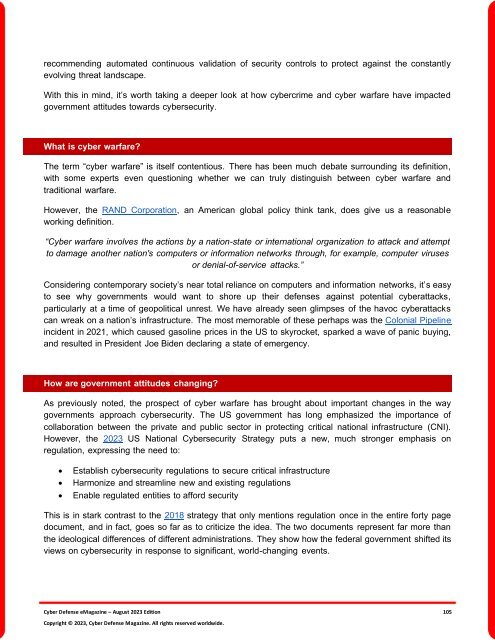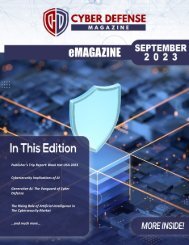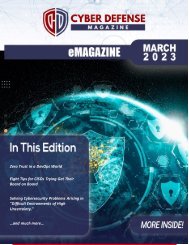The Cyber Defense eMagazine August Edition for 2023
Cyber Defense eMagazine August Edition for 2023 #CDM #CYBERDEFENSEMAG @CyberDefenseMag by @Miliefsky a world-renowned cyber security expert and the Publisher of Cyber Defense Magazine as part of the Cyber Defense Media Group as well as Yan Ross, Editor-in-Chief and many more writers, partners and supporters who make this an awesome publication! Thank you all and to our readers! OSINT ROCKS! #CDM #CDMG #OSINT #CYBERSECURITY #INFOSEC #BEST #PRACTICES #TIPS #TECHNIQUES
Cyber Defense eMagazine August Edition for 2023 #CDM #CYBERDEFENSEMAG @CyberDefenseMag by @Miliefsky a world-renowned cyber security expert and the Publisher of Cyber Defense Magazine as part of the Cyber Defense Media Group as well as Yan Ross, Editor-in-Chief and many more writers, partners and supporters who make this an awesome publication! Thank you all and to our readers! OSINT ROCKS! #CDM #CDMG #OSINT #CYBERSECURITY #INFOSEC #BEST #PRACTICES #TIPS #TECHNIQUES
Create successful ePaper yourself
Turn your PDF publications into a flip-book with our unique Google optimized e-Paper software.
ecommending automated continuous validation of security controls to protect against the constantly<br />
evolving threat landscape.<br />
With this in mind, it’s worth taking a deeper look at how cybercrime and cyber warfare have impacted<br />
government attitudes towards cybersecurity.<br />
What is cyber warfare?<br />
<strong>The</strong> term “cyber warfare” is itself contentious. <strong>The</strong>re has been much debate surrounding its definition,<br />
with some experts even questioning whether we can truly distinguish between cyber warfare and<br />
traditional warfare.<br />
However, the RAND Corporation, an American global policy think tank, does give us a reasonable<br />
working definition.<br />
“<strong>Cyber</strong> warfare involves the actions by a nation-state or international organization to attack and attempt<br />
to damage another nation's computers or in<strong>for</strong>mation networks through, <strong>for</strong> example, computer viruses<br />
or denial-of-service attacks.”<br />
Considering contemporary society’s near total reliance on computers and in<strong>for</strong>mation networks, it’s easy<br />
to see why governments would want to shore up their defenses against potential cyberattacks,<br />
particularly at a time of geopolitical unrest. We have already seen glimpses of the havoc cyberattacks<br />
can wreak on a nation’s infrastructure. <strong>The</strong> most memorable of these perhaps was the Colonial Pipeline<br />
incident in 2021, which caused gasoline prices in the US to skyrocket, sparked a wave of panic buying,<br />
and resulted in President Joe Biden declaring a state of emergency.<br />
How are government attitudes changing?<br />
As previously noted, the prospect of cyber warfare has brought about important changes in the way<br />
governments approach cybersecurity. <strong>The</strong> US government has long emphasized the importance of<br />
collaboration between the private and public sector in protecting critical national infrastructure (CNI).<br />
However, the <strong>2023</strong> US National <strong>Cyber</strong>security Strategy puts a new, much stronger emphasis on<br />
regulation, expressing the need to:<br />
• Establish cybersecurity regulations to secure critical infrastructure<br />
• Harmonize and streamline new and existing regulations<br />
• Enable regulated entities to af<strong>for</strong>d security<br />
This is in stark contrast to the 2018 strategy that only mentions regulation once in the entire <strong>for</strong>ty page<br />
document, and in fact, goes so far as to criticize the idea. <strong>The</strong> two documents represent far more than<br />
the ideological differences of different administrations. <strong>The</strong>y show how the federal government shifted its<br />
views on cybersecurity in response to significant, world-changing events.<br />
<strong>Cyber</strong> <strong>Defense</strong> <strong>eMagazine</strong> – <strong>August</strong> <strong>2023</strong> <strong>Edition</strong> 105<br />
Copyright © <strong>2023</strong>, <strong>Cyber</strong> <strong>Defense</strong> Magazine. All rights reserved worldwide.

















